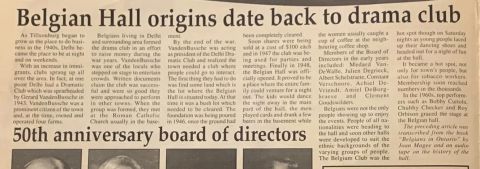Belgian Hall origins date back to drama club
Delhi News-Record
As Tillsonburg began to grow as the place to do business in the 1940s, Delhi became the place to be at night and on weekends.
With an increase in immigrants, clubs sprang up all over the area. In fact, at one point Delhi had a Dramatic Club which was spearheaded by Gerard VandenBussche in 1943. VandenBussche was a prominent citizen of the town and, at the time, owned and operated four farms.
Belgians living in Delhi and surrounding area formed the drama club in an effort to raise money during the war years. VandenBussche was one of the locals who stepped on stage to entertain crowds. Written documents claim the club was successful and even so good they were approached to perform in other towns. When the group was formed, they met at the Roman Catholic Church usually in the basement.
By the end of the war, VandenBussche was acting as president of the Delhi Dramatic Club and realized the town needed a club where people could go to interact. The first thing they had to do was find some land which is the lot where the Belgian Hall is situated today. At that time it was a bush lot which needed to be cleared. The foundation was being poured in 1946, once the ground had been completely cleared.
Soon shares were being sold at a cost of $100 each and in 1947 the club was being used for parties and meetings. Finally in 1948, the Belgian Hall was officially opened. It proved to be a place where the entire family could venture for a night out. The kids would dance the night away in the main part of the hall, the men played cards and drank a few beers in the basement while the women usually caught a cup of coffee at the neighbouring coffee shop.
Members of the Board of Directors in the early years included: Medard VanDeWalle, Julien Degrieck, Albert Schelstraete, Constant Verschoore, Achiel DeVriendt, Amiel DeBorghgraeve and Clement Goudsviders.
Belgians were not the only ones showing up to enjoy the events. People of all nationalities were welcomed at the hall and soon other halls were developed to suit the ethnic backgrounds of the varying groups of people. The Belgium Club was the hot spot though on Saturday nights as young people laced up their dancing shoes and headed out for a night of fun at the hall.
It became a hot spot, not only for town’s people, but also for tobacco workers. Membership soon reached numbers in the thousands.
In the 1960s, top performers such as Bobby Curtola, Chubby Checker and Roy Orbison graced the stage at the Belgian hall.
The preceding article was transcribed from the book “Belgians in Ontario” by Joan Magee and an audio tape on the history of the hall.

